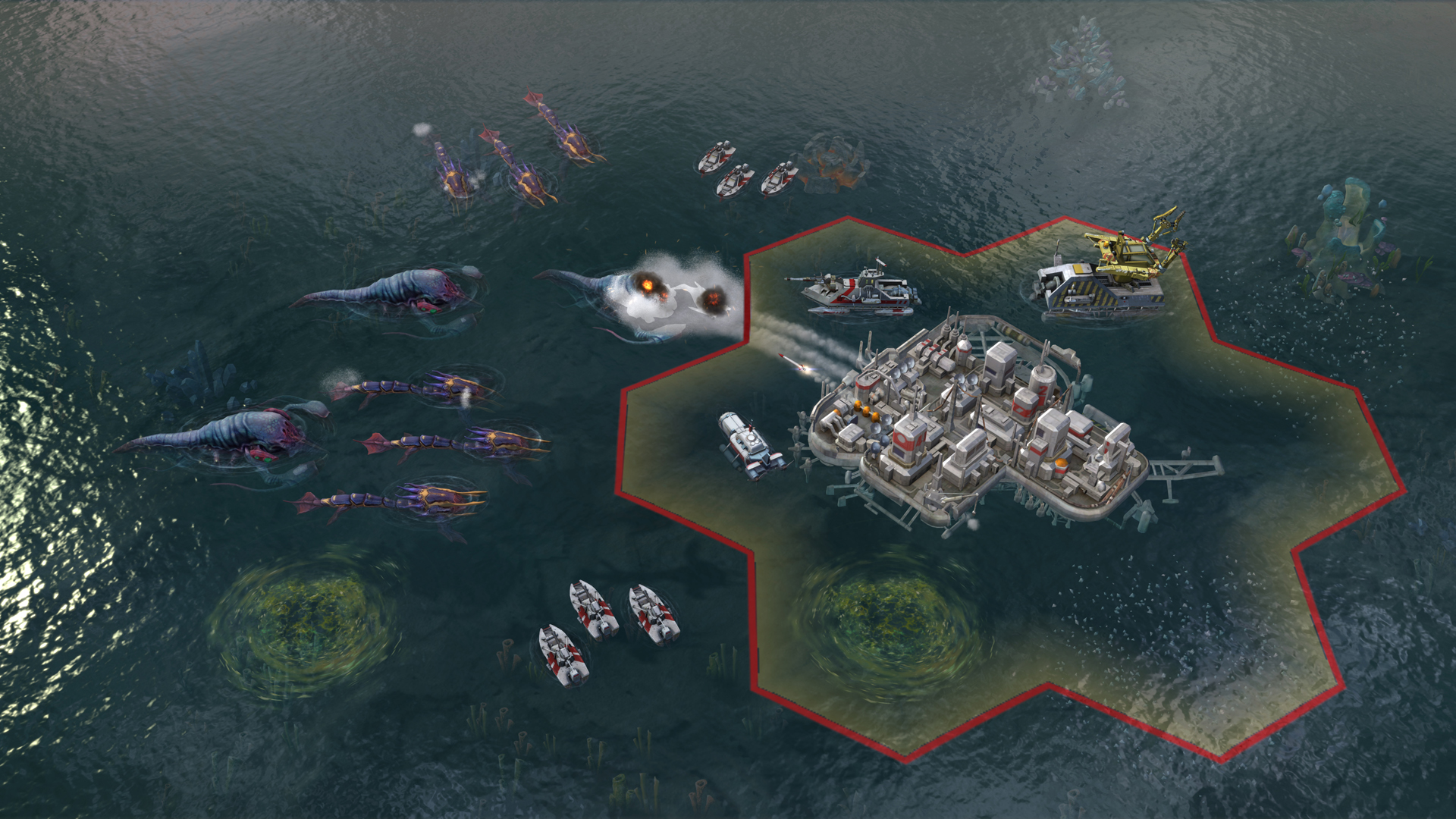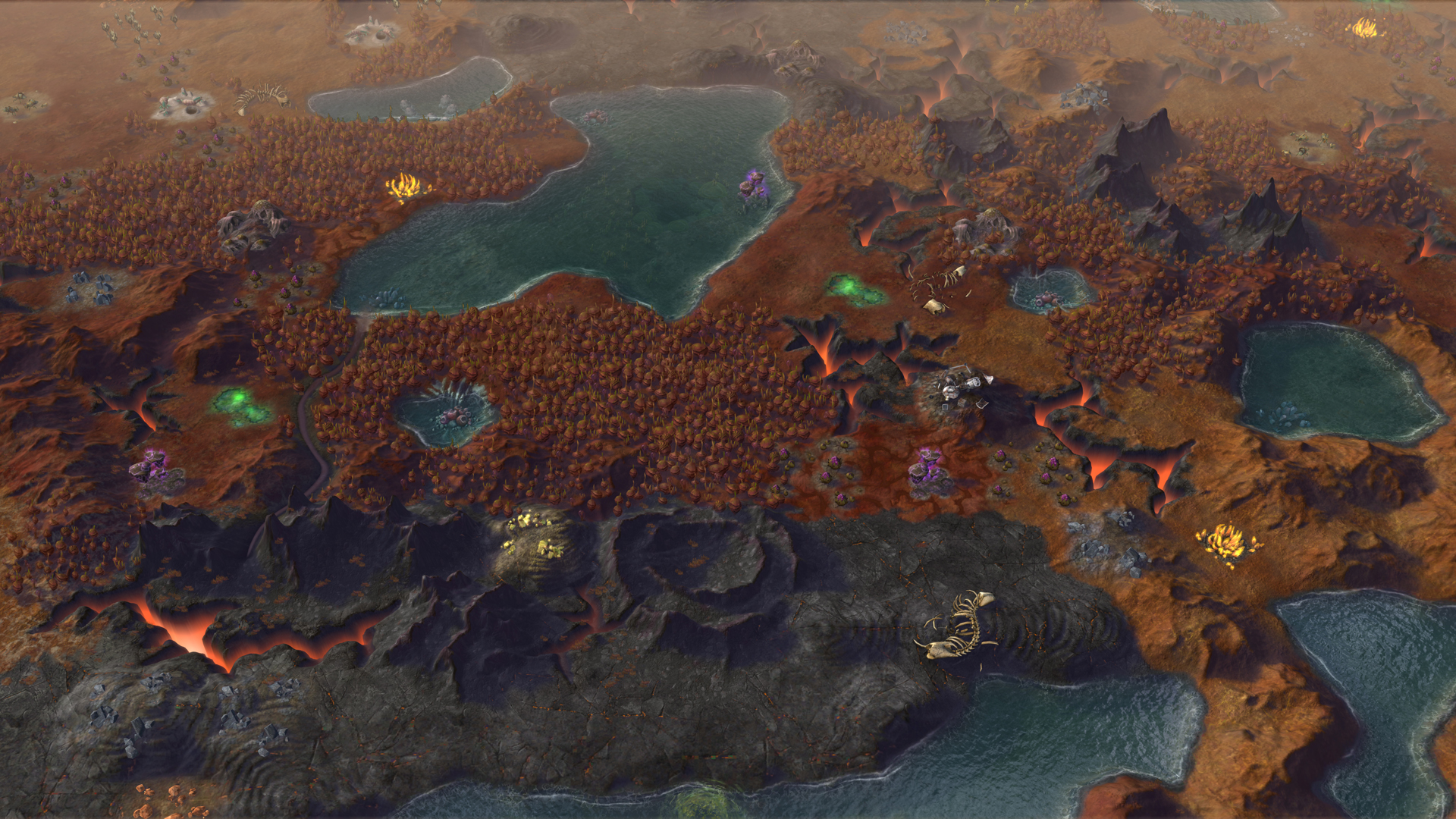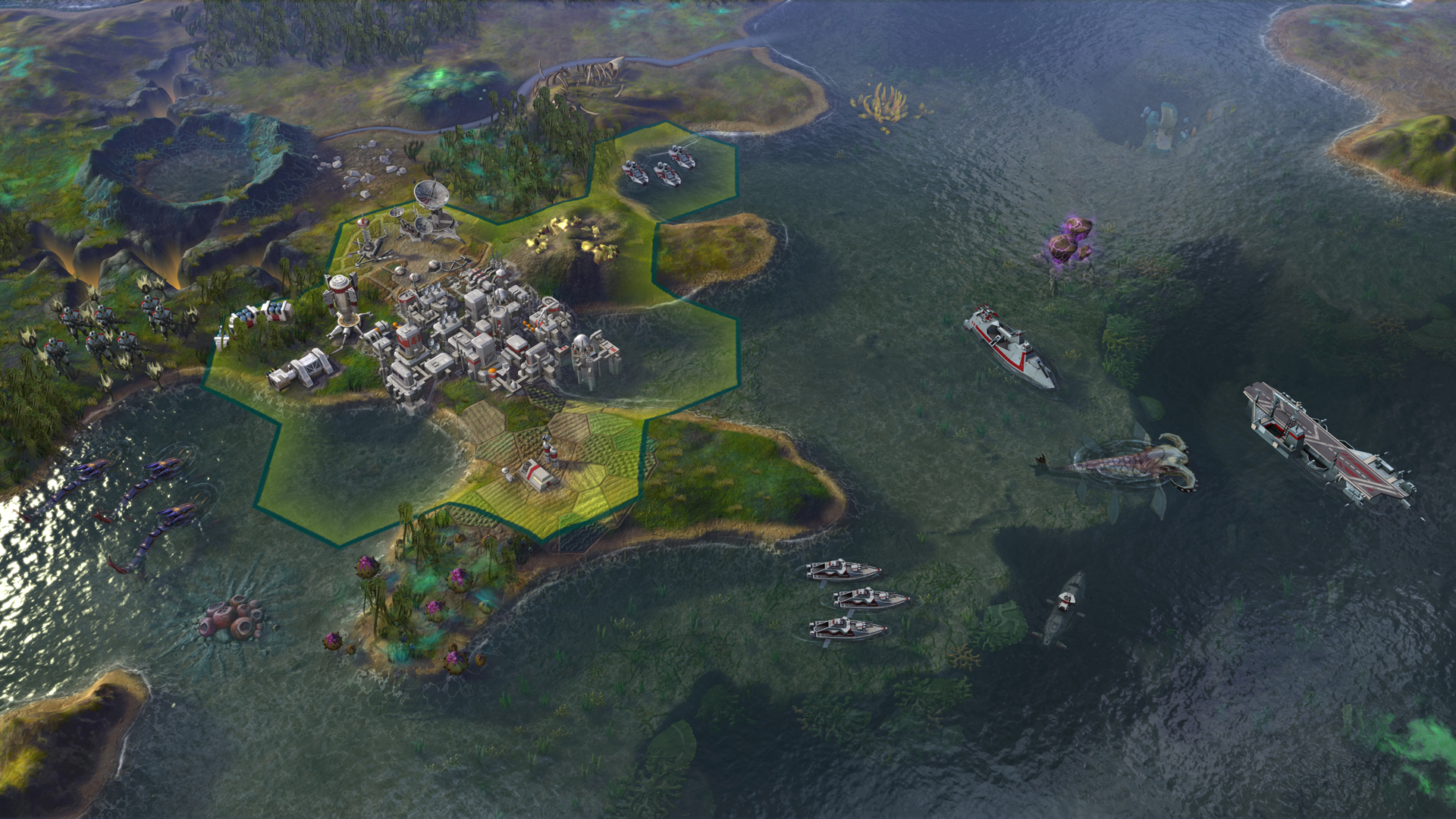Conquering the ocean in Beyond Earth's first expansion

Firaxis has just announced the first expansion for Civilization: Beyond Earth, a chunky package that promises to deepen diplomacy, add new playable factions and let you conquer the high seas with new units. We caught up with Beyond Earth's two lead designers to find out more.
PC Gamer: Can you give me an overview of what's going to be in the expansion?
Will Miller, Co-Lead Designer: There are several highlights in this expansion, and one of them as you mentioned is aquatic gameplay, we're really excited about that. The second is an overhauled diplomacy system. This is a brand new take on diplomacy for a Civ game. Hybrid affinities is another big one. So we had three affinity tracks in the first game and a lot of players who tried to multiclass—going down two tracks instead of just one—found themselves not able to access some of the cool units late game. So we've added three new affinities to sit between the big ones, to fill out those gaps. They come with unique units, and unique benefits that the player can get, along with a lot of other tweaks and balance changes and some smaller additions to things like the quest system are all going in, to expand in a significant way the original gameplay.
David McDonough, Co-Lead Designer: Not to forget, there are also four new playable factions.
WM: Oh yeah.
PC Gamer: Can you talk about the new playable factions one-by-one?
DM: Yeah, we're really excited about these. We built on the story of the original Beyond Earth, and introduced these four newcomers who are late to the seeding process. They come from a different angle that's a lot more extreme and intense, so we like to say these four guys will raise the stakes for the original eight. In no particular order, there's Al Falah, a Middle East-themed faction [2K cuts in]...and then there's three others I'll tell you about later. Al Falah are the people who didn't leave. They reclaimed their homeland and made it into space, on a much different and much more treacherous path than the other seeding people. And when they arrived on the planet, they travelled through space not asleep, so it's a generation shift—the people who land on the planet are not the people who left Earth. So there are people who have never seen Earth, maybe never seen a planet. So when they land, they have a lot of different perspectives, different strengths and weaknesses from colonists from the original eight. They're an interesting leftfield expansion faction.
The biggest gaming news, reviews and hardware deals
Keep up to date with the most important stories and the best deals, as picked by the PC Gamer team.
PC Gamer: How does aquatic gameplay affect the fundamentals of Civ, like building your civilization or exploring the map?
DM: You've described the big things that players do with their cities and their territory—and the water in Civ has always been an alternative play space, you play primarily on land and the water is there for a different kind of interaction. We wanted to preserve that and extend the richness of Civ's power base to the water so that your territory, your play space, is the whole planet. There's no part of the planet that's off limits to you. You can play an entirely aquatic Civ or entirely on land and have equal opportunities for power. So a lot of things you would expect from a city and territory are there: there's naval units, naval aliens, a full range of things to explore, fight and settle at sea. But there's a number of twists to the way that they're done, so you can expect the same kind of opportunities you have on land at sea but the challenges you face may be totally different. Playing successfully in aquatic cities and territory may be a whole new strategic proposition. Certainly playing as a hybrid will be a brand new way to play. The thing we're most excited about with aquatic gameplay is that, just by having it at all, and the particular choices that we've made, it totally changes the way all cities are played, land and water alike. It's a completely new way to approach settlement power and competition, and the grandest part of the strategy of Civilization, settling and building up.

PC Gamer: So this expansion brings new unit types as well?
DM: Certainly does. There's a couple of new Naval units—there's a naval melee unit, we brought submarines back so you can have your invisible hunter killers again. And then a variety of other changes to the existing unit catalogue to be more aquatic or to introduce more hovering units so you have armies that are amphibious so they can travel back and forth just fine. And there's a great deal more aliens. There's all kinds of new aquatic aliens, but their behaviour is totally different: the way they spawn, the way they live at sea, is totally different. You have new opportunities for interaction with them as well.
PC Gamer: How will hybrid affinities affect the way a typical game of Beyond Earth plays out?
WM: Well the base game tries to funnel you down a single affinity. The mechanics are designed to make that the cheapest way to play, and the victory conditions are aligned with those three affinities. One of the things we've wanted to do is support players who want to broaden their choices. They want to play a split or perhaps all three, and we've filled in the unit catalogue with new units, new unique units that support that. And at the highest end of our upgrade tree, we've introduced hybrid versions, so things like the ranged marine: these basic unit types now have additional options for upgrading and hybridising your approach to affinity. And we've rebalanced the affinity themed victory conditions to make them achievable by hybrid players. So this is really cool: each of those affinities definitely caters to a particular playstyle in the tactical part of the game. Introducing hybrid units is to help those tactics change and be augmented and supported.
PC Gamer: What challenges did this bring to balancing the existing affinities?
WM: Any time you add that many units to the game, it's going to be a challenge to balance it. As affinities work in the base game, they work to specific play styles—so we can target these units' abilities to augment those play styles. We do a lot of internal testing and testing with our beta group to help us do that, but it's certainly a challenge when you add that much stuff to the catalogue.

PC Gamer: How does the revamped diplomacy system work vs the existing system?
WM: We're trying not to get into too many details, but I can give you a philosophical overview. One of our takeaways from the original release of Beyond Earth is that without the historical characters, the diplomacy system from Civ V doesn't really carry over to a science fiction setting. Because the player doesn't have that built-in knowledge of the stories behind those characters. Playing Civ V, you know Gandhi is going to behave a certain way, because you are familiar with those characters from history. We don't really have that in our fiction and in our audience. So we have to build a system that supports the player in making decisions about what they're doing in a diplomatic landscape. And we wanted to take that and make it more of a game, to bring more of its mechanics out in front of the player, to give it a bit of progression, and to make the decision making of the AI and the player into a game. We're, I guess, inspired by boardgames here. So games like Tales of the Arabian Knights, where your character in that game is a combination of attributes that you pick up along the way. That was an inspiration for this. So the diplomacy system does a very good job of giving the player the ability to wheel and deal on the diplomatic landscape, to understand the AI's personality better, and to understand when that personality changes—as well as crafting their own personalities across the course of the game to reinforce their play style. That's a high level overview, and I'm excited to get into the details, but I don't think we can go much more than.
PC Gamer: With Civ, it feels like you treat expansions differently to other series. It's almost like the base game is a platform and you build on top of that—is that fair to say?
WM: I'd say it's a fair assessment for how Civ normally works for expansions, yeah. I'd say our expansion sits somewhere between a traditional Civ expansion and the XCOM expansion. Think about the XCOM expansion and how that really changed the gameplay at a fundamental level—that's kind of what we're going for. Previous Civ expansions have done that, but the diplomacy system is a wholesale replacement of that system... Playing this game is going to be very different to playing the base game. It's deep systemic changes.
DM: When Enemy Within came out, some critics described it as a Firaxis-style expansion, an expansion that changes everything about the way the game plays. I really liked that, and I think the expansion we're making now really earns that.


